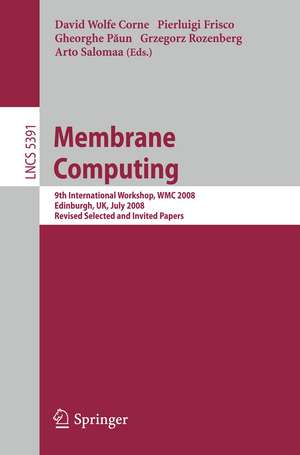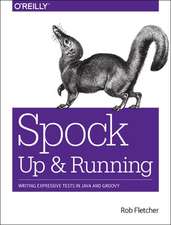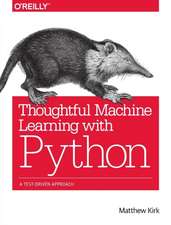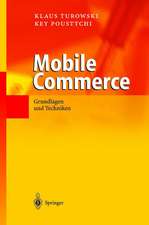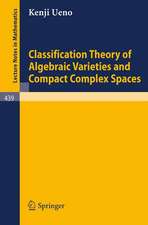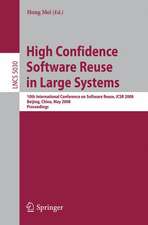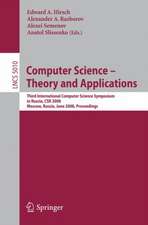Membrane Computing: 9th International Workshop, WMC 2008, Edinburgh, UK, July 28-31, 2008, Revised Selected and Invited Papers: Lecture Notes in Computer Science, cartea 5391
Editat de David Corne, Pierluigi Frisco, Gheorghe Păun, Grzegorz Rozenberg, Arto Salomaaen Limba Engleză Paperback – 20 ian 2009
Din seria Lecture Notes in Computer Science
- 20%
 Preț: 1061.55 lei
Preț: 1061.55 lei - 20%
 Preț: 307.71 lei
Preț: 307.71 lei - 20%
 Preț: 438.69 lei
Preț: 438.69 lei - 20%
 Preț: 579.30 lei
Preț: 579.30 lei -
 Preț: 410.88 lei
Preț: 410.88 lei - 17%
 Preț: 427.22 lei
Preț: 427.22 lei - 20%
 Preț: 596.46 lei
Preț: 596.46 lei - 15%
 Preț: 448.04 lei
Preț: 448.04 lei - 20%
 Preț: 353.50 lei
Preț: 353.50 lei -
 Preț: 389.49 lei
Preț: 389.49 lei - 20%
 Preț: 309.90 lei
Preț: 309.90 lei - 20%
 Preț: 645.28 lei
Preț: 645.28 lei - 20%
 Preț: 763.23 lei
Preț: 763.23 lei - 15%
 Preț: 580.46 lei
Preț: 580.46 lei - 20%
 Preț: 310.28 lei
Preț: 310.28 lei - 20%
 Preț: 655.02 lei
Preț: 655.02 lei - 20%
 Preț: 1183.14 lei
Preț: 1183.14 lei - 20%
 Preț: 340.32 lei
Preț: 340.32 lei -
 Preț: 449.57 lei
Preț: 449.57 lei - 20%
 Preț: 591.51 lei
Preț: 591.51 lei - 18%
 Preț: 938.83 lei
Preț: 938.83 lei - 20%
 Preț: 337.00 lei
Preț: 337.00 lei - 20%
 Preț: 649.50 lei
Preț: 649.50 lei - 20%
 Preț: 607.40 lei
Preț: 607.40 lei - 20%
 Preț: 1414.79 lei
Preț: 1414.79 lei - 20%
 Preț: 1024.44 lei
Preț: 1024.44 lei - 20%
 Preț: 583.40 lei
Preț: 583.40 lei - 20%
 Preț: 453.32 lei
Preț: 453.32 lei - 20%
 Preț: 575.49 lei
Preț: 575.49 lei - 20%
 Preț: 1075.26 lei
Preț: 1075.26 lei - 20%
 Preț: 585.88 lei
Preț: 585.88 lei - 20%
 Preț: 825.93 lei
Preț: 825.93 lei - 17%
 Preț: 360.20 lei
Preț: 360.20 lei - 20%
 Preț: 763.23 lei
Preț: 763.23 lei - 20%
 Preț: 340.32 lei
Preț: 340.32 lei - 20%
 Preț: 504.58 lei
Preț: 504.58 lei - 20%
 Preț: 369.13 lei
Preț: 369.13 lei - 20%
 Preț: 580.93 lei
Preț: 580.93 lei - 20%
 Preț: 343.62 lei
Preț: 343.62 lei - 20%
 Preț: 350.21 lei
Preț: 350.21 lei - 20%
 Preț: 583.40 lei
Preț: 583.40 lei - 20%
 Preț: 583.40 lei
Preț: 583.40 lei - 15%
 Preț: 438.59 lei
Preț: 438.59 lei - 20%
 Preț: 341.95 lei
Preț: 341.95 lei - 20%
 Preț: 238.01 lei
Preț: 238.01 lei - 20%
 Preț: 538.30 lei
Preț: 538.30 lei
Preț: 339.47 lei
Preț vechi: 424.34 lei
-20% Nou
Puncte Express: 509
Preț estimativ în valută:
64.97€ • 67.57$ • 53.63£
64.97€ • 67.57$ • 53.63£
Carte tipărită la comandă
Livrare economică 14-28 aprilie
Preluare comenzi: 021 569.72.76
Specificații
ISBN-13: 9783540958840
ISBN-10: 3540958843
Pagini: 416
Ilustrații: IX, 403 p.
Dimensiuni: 155 x 235 x 23 mm
Greutate: 0.61 kg
Ediția:2009
Editura: Springer Berlin, Heidelberg
Colecția Springer
Seriile Lecture Notes in Computer Science, Theoretical Computer Science and General Issues
Locul publicării:Berlin, Heidelberg, Germany
ISBN-10: 3540958843
Pagini: 416
Ilustrații: IX, 403 p.
Dimensiuni: 155 x 235 x 23 mm
Greutate: 0.61 kg
Ediția:2009
Editura: Springer Berlin, Heidelberg
Colecția Springer
Seriile Lecture Notes in Computer Science, Theoretical Computer Science and General Issues
Locul publicării:Berlin, Heidelberg, Germany
Public țintă
ResearchCuprins
Invited Lectures.- Investigation of a Biological Repair Scheme.- An Introduction to BioModel Engineering, Illustrated for Signal Transduction Pathways.- Multilevel Modeling of Morphogenesis.- A Definition of Cellular Interface Problems.- A Multiscale Modeling Framework Based on P Systems.- Regular Papers.- On the Qualitative Analysis of Conformon P Systems.- Dual P Systems.- Solving PP-Complete and #P-Complete Problems by P Systems with Active Membranes.- Fast Synchronization in P Systems.- Membrane Systems Using Noncooperative Rules with Unconditional Halting.- Modeling Ecosystems Using P Systems: The Bearded Vulture, a Case Study.- MetaPlab: A Computational Framework for Metabolic P Systems.- Usefulness States in New P System Communication Architectures.- A P-Lingua Programming Environment for Membrane Computing.- On Testing P Systems.- Hebbian Learning from Spiking Neural P Systems View.- Event-Driven Metamorphoses of P Systems.- Effects of HIV-1 Proteins on the Fas-Mediated Apoptotic Signaling Cascade: A Computational Study of Latent CD4+ T Cell Activation.- Transforming State-Based Models to P Systems Models in Practice.- How Redundant Is Your Universal Computation Device?.- Enumerating Membrane Structures.- Toward an MP Model of Non-Photochemical Quenching.- Applications of Page Ranking in P Systems.- An Algorithm for Non-deterministic Object Distribution in P Systems and Its Implementation in Hardware.- First Steps Towards a Wet Implementation for ?-DPP.- Defining and Executing P Systems with Structured Data in K.- Translating Multiset Tree Automata into P Systems.
Textul de pe ultima copertă
This book constitutes the thoroughly refereed extended postproceedings of the 9th International Workshop on Membrane Computing, WMC 2008, held in Edinburgh, UK, in July 2008 under the auspices of the European Molecular Computing Consortium (EMCC) and the Molecular Computing Task Force of IEEE Computational Intelligence Society.
The 22 revised full papers presented together with 5 invited papers went through two rounds of reviewing and improvement. The papers in this volume cover all the main directions of research in membrane computing, ranging from theoretical topics in mathematics and computer science to application issues. A special attention was paid to the interaction of membrane computing with biology and computer science, focusing both on the biological roots of membrane computing, on applications of membrane computing in biology and medicine, and on possible electronically based implementations.
The 22 revised full papers presented together with 5 invited papers went through two rounds of reviewing and improvement. The papers in this volume cover all the main directions of research in membrane computing, ranging from theoretical topics in mathematics and computer science to application issues. A special attention was paid to the interaction of membrane computing with biology and computer science, focusing both on the biological roots of membrane computing, on applications of membrane computing in biology and medicine, and on possible electronically based implementations.
